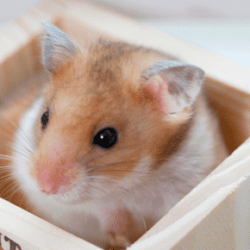How to prevent parasites in hamsters, gerbils, and guinea pigs
Parasites are a common concern for small pets like hamsters, gerbils, and guinea pigs; they are susceptible to a variety of parasites that can cause serious health problems if left untreated. In this article, one of our Devizes vets is looking at some of the most common parasites that affect these popular pets and what you can do to protect them.
Notice the signs below? Contact us
Mites
According to our vet Scott, one of the most common parasites that affect small pets is the mite. Mites are tiny, eight-legged creatures that can cause severe itching and irritation. They are most commonly found on the skin, in the ears, and in the eyes. Mites can be difficult to detect because they are so small, but they can cause severe itching and scratching, hair loss, and even secondary infections. Have you spotted any of these signs of mites on your hamster, fancy rat, or gerbil? It’s important to keep your pet’s cage clean to try and prevent mites. We recommend that you book an appointment at our Estcourt Street surgery if you have any concerns.
Lice
Another common parasite that affects small pets is the lice. Lice are tiny insects that live on the skin and fur of small pets. They can cause itching and scratching, and they can also lead to secondary infections. Lice can be difficult to detect, but they can be treated with topical medications that can be prescribed by Scott or another of our vets.
Worms
When compared to mice and rats, tapeworm infection in hamsters is more common. Typically, hamsters contract tapeworms from contaminated water and/or feed. It is wise to be aware that some tapeworms that infect hamsters can also infect people. Worms can cause diarrhoea, weight loss, and other health issues. Treatment for internal parasites typically involves a medication prescribed by one of our vets.
Coccidia in Guinea pigs
Guinea pigs, in particular, are also at risk of getting a specific parasite, Coccidia which is a protozoan that can cause diarrhoea and weight loss.
To protect your small pet from parasites, it’s essential to maintain good hygiene in their living area and to schedule regular vet check-ups with our team here at Estcourt Vets. Keeping the cage clean and disinfected (look for pet-safe products), providing fresh food and water, and preventing your pet from coming into contact with wild animals or their faeces, can also reduce the risk of parasite infestation.
In conclusion, Scott advises that although parasites are a common concern for small pets, by keeping a close eye on your pet’s health, providing proper care and hygiene, and consulting with our vets, you can protect your beloved small pet from the harmful effects of these parasites.
[Contact us if you notice the signs above]
< Back to articles Estcourt Vets Devizes
Estcourt Vets Devizes